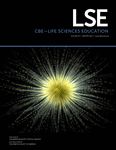Toward High School Biology: Helping Middle School Students Understand Chemical Reactions and Conservation of Mass in Nonliving and Living Systems
Abstract
Modern biology has become increasingly molecular in nature, requiring students to understand basic chemical concepts. Studies show, however, that many students fail to grasp ideas about atom rearrangement and conservation during chemical reactions or the application of these ideas to biological systems. To help provide students with a better foundation, we used research-based design principles and collaborated in the development of a curricular intervention that applies chemistry ideas to living and nonliving contexts. Six eighth grade teachers and their students participated in a test of the unit during the Spring of 2013. Two of the teachers had used an earlier version of the unit the previous spring. The other four teachers were randomly assigned either to implement the unit or to continue teaching the same content using existing materials. Pre- and posttests were administered, and the data were analyzed using Rasch modeling and hierarchical linear modeling. The results showed that, when controlling for pretest score, gender, language, and ethnicity, students who used the curricular intervention performed better on the posttest than the students using existing materials. Additionally, students who participated in the intervention held fewer misconceptions. These results demonstrate the unit’s promise in improving students’ understanding of the targeted ideas.



